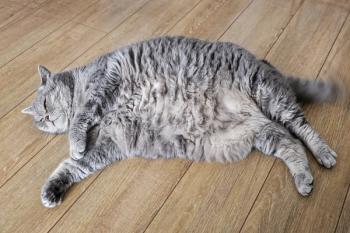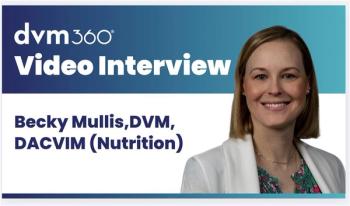
Working together with nutritionists on dairy farms-can't we all get along (Proceedings)
I have had the great opportunity to work professionally in a variety of positions including private practice veterinarian, extension veterinarian, and tech service nutritionist for a major feed company.
I have had the great opportunity to work professionally in a variety of positions including private practice veterinarian, extension veterinarian, and tech service nutritionist for a major feed company. These experiences have provided me with the chance to experience both the good and the bad of interactions between veterinarians and nutritionists on dairy farms. While performing my industry job, I also saw many surveys that listed both veterinarians and nutritionists as the dairy farmer's most important sources of trusted information. This demonstrates the importance of both professions within a successful dairy operation and underlines the importance of the need of the professionals working on a dairy farm to find ways to work together to help each other, the dairy farmer, and the cows. The following discussion will hopefully shed some light on how veterinarians and dairy nutritionists perceive themselves and one another in their roles on their clients' dairy farms. With better understanding, comes the potential that we can build proactive teams that help our dairy farmers to be productive and profitable.
As a personal anecdote, as a new veterinarian working in central New York I was vaccinating cows in a tie-stall barn along with the farmer. His nutritionist came in the door at the far end of the barn, so he left me to carry on by myself as he went to discuss feed questions with the nutritionist. As I went to vaccinate the next cow, I suddenly found myself knocked head over heels by a double-barreled mule kick to the chest. The farmer sheepishly said, "Sorry about that doc, she's a wild one." At that moment I told myself that I would improve my understanding and abilities in the field of dairy nutrition so I ended up the one uninjured, clean, and serving as source of information for the dairyman rather than the one in the gutter with hoof prints on my chest! While I love doing traditional veterinary practice, I also love dairy nutrition and trying to find ways to prevent problems rather than fix them after the fact. I would encourage veterinarians and veterinary students to seriously look at the potential of offering nutritional services as part of your practice. As the role of the dairy veterinarian changes with time we need to look for other areas on the dairy that we can be of service to our clients. We have the ability and education to provide nutritional information to our clients. With a little bit of additional training and some dedication to learning the art of dairy nutrition we can do it – don't be scared by your initial perceived lack of knowledge.
With all that said, you may not want to get involved in dairy nutrition to the extent of putting together rations for your dairy farms. That is fine – there are a lot of very qualified nutritionists working on the same dairies we service. The focus of this discussion is for you. How can you better understand the nutritionists working on those dairies so you can form a winning team to help your dairy farmers be successful? That is where both you and the nutritionist should be focusing. We can't let professional jealousy or ego get in the way of the success of our clients and the health of their cows!
While not much has been written in peer-reviewed journals comparing the roles and perceptions of dairy nutritionists and dairy veterinarians, Oetzel (Oetzel, 2000) did summarize some historical perceived differences between the two professions. Oetzel described dairy veterinarians as individuals historically working primarily with the outliers in herd management systems (as represented by individual animals with health problems). Additionally, veterinarians were described as being trained to always make at least a tentative diagnosis and initiate treatment, even if diagnostic data are incomplete or obscure, and to find a single cause to health problems, which could cause some discomfort with multi-factorial causes. In contrast, nutritionists were described as being more attuned to central tendencies, while tending to be less likely to make diagnostic decisions in response to unclear herd problems and typically more comfortable integrating multiple causes of herd problems. I find these general descriptions to be true, especially those of the nutritionists. While working as a nutritionist and providing support to other nutritionists, I definitely found nutritionists to be very understanding of the fact that most herd problems are actually the result of the cumulative effects of a number of causes rather than a single cause and that they were hesitant to institute major ration changes without solid evidence. This points to a general understanding of the fact that a portion of herd problems may be due to normal variation rather than a disease or illness. I also tend to believe that although veterinarians have been classically trained to treat the individual animal, progressive dairy veterinarians are also very adept at recognizing the multi-factorial causes of herd problems and synthesizing herd management plans.
Beyond training differences, Oetzel also described veterinarians as having the great advantage of dealing within the realm of "high mystique" due to making life and death decisions, which affords veterinarians a disproportionately high standing with dairy producers. Additionally, veterinarians were thought to likely be given the benefit of the doubt by producers, thereby allowing them to be bolder in implementing herd changes. A more stable situation also potentially allows veterinarians to be concerned with longer term issues such as cow health and culling. By contrast, nutritionists tend to have a less secure position with many clients (possibly because of the relative ease of finding a different nutritionist with whom to work) and are therefore more cautious making decisions for fear of making a mistake. This position tends to force nutritionists to focus on short-term goals such as milk production. From my variety of viewpoints during my professional career, I would tend to strongly agree with these observations.
The work of Oetzel provides us with somewhat of a framework within which to examine the relationship of dairy veterinarians and nutritionists, but I would like to offer you my personal views and observations. As a food-animal veterinarian I believe that we look at ourselves in the following ways. First, we spent a considerable amount of time and money to get where we are, and we truly enjoy what we do, but there are times that it is a physically difficult job and we sometimes feel we are not fully appreciated by our clients. Regardless, because of our knowledge and experience, we have put ourselves in a position to protect our clients and their cows from many types of threats and this makes us very important on the farm. Nutritionists see veterinarians as being very influential in many areas on dairy farms, including nutrition, even though our nutrition backgrounds may not be that strong. They also see us as oftentimes being too busy, and therefore possibly not being current on some topics, including nutrition. Most importantly, they view us as being excellent help on the dairy if they can cultivate a good working relationship with us.
So what do nutritionists think of themselves? At least for me, I saw many field nutritionists who had spent a lot of time learning what they knew so they could provide better service to their clients. They felt that they worked hard but weren't always appreciated by the dairy farmer and were therefore easy targets if a dairy was struggling. Finally, they often thought that dairy producers would ask them for information, even on animal health, because we weren't taking the time to provide the information that dairy farmers needed. My perception is that veterinarians see nutritionists as possibly not having a great knowledge base and possibly as a professional who is trying to sell something to our clients that they don't need. We also see nutritionists as often making recommendations beyond their field that they are not qualified to make. These perceptions can create a climate of mistrust. However, I also saw many situations where veterinarians appreciated the input from nutritionists and thought they could be excellent members of the management team on a dairy.
So what does all this mean? To me it means that we have to remember that perceptions become reality and we as professionals, need to make sure these perceptions don't cloud our judgment or get in the way of our job of keeping cows healthy and productive and our clients successful. While there are definitely bad nutritionists out there, just as there are also bad veterinarians, most do a very good job and want the same things for our clients that we want. We need to try to cultivate relationships with the nutritionists working with our clients. We are already doing a better job of this than in the past, but we need to keep working on it. Good relationships between you and the nutritionists working for your clients can be very rewarding if they can be established. I have found them to be excellent sources of new knowledge and for information on about our dairies that we can use at other clients. They can provide both parties with farm observations that the other may have missed. Taken as a sum, strong relationships between the professional on a dairy provide opportunities to become better at our jobs, make cows more productive and healthy, and keep our clients successful. We owe it to ourselves, the cows, and our clients to try to establish and cultivate these relationships. They deserve nothing less.
References:
Oetzel, G.R. 2000. Differences between dairy nutritioinists and veterinarians and the effect on educational strategies. J. Dairy Sci., 83 (Suppl. 1): 103
Newsletter
From exam room tips to practice management insights, get trusted veterinary news delivered straight to your inbox—subscribe to dvm360.






